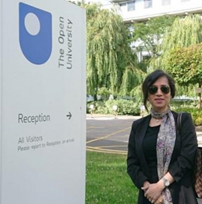You are here
- Home
- Blog
- The impact on students' learning experience of incorporating background music into audio-visual content within online learning
The impact on students' learning experience of incorporating background music into audio-visual content within online learning

By Dr Morteza Abolhasani, Professor Gordon Liu, Dr Zahra Golrokhi and Dr Giacomo Carli
In this blog, colleagues from The Open University Business School and the School of Engineering and Innovation discuss their recent scholarship research project investigating the effects of background music used in audio-visual materials in the context of online asynchronous learning.
The research focuses on understanding how the presence or absence of background music impact students' attitude towards the learning tasks and educational institution, comprehension, recall of module materials, and involvement in the module tasks, within the online learning environment.
Music in online audio-visual learning materials
Distance learning institutions, such as The Open University provide their module materials through their Virtual Learning Environment (VLE) and module websites. Specifically, there are a large number of audio/video materials within the VLE (in the form of talking heads, interviews, secondary material from external sources etc.), some of which are accompanied by background music and some others with no music in the background. There seems to be a need for further research on the impact of utilising background music in the audio-visual materials presented in the modules on variables such as students’ attitude towards the educational institution, involvement in the module tasks, attitude towards module tasks, and recall of module materials.

Research on the effects of listening to background music on concurrent mental processing has produced contentious findings. Kämpfe et al. (2011) suggests that although listening to music seems to positively affect emotions, it appears to interfere with reading and memory tasks. On the other hand, research (e.g., Bottiroli et al., 2014; Rauscher et al., 1993) report that listening to Mozart improved declarative memory tasks (the so-called Mozart effect). Martin et al. (1988) suggests that reading comprehension was impaired when concurrent music was played, contradicting the music and cognition literature which proposes that listening to liked pieces of music increases cognitive performance (Hallam et al., 2002; Thompson et al., 2001; Wallace, 1994).
Indeed, it is difficult to predict specific effects when we consider many forms of music and multiple experimental procedures used in various studies. In order to fully understand the effects of music on students’ learning experience, attitudes, and task-related performance, we must consider the context within which the task is taking place, as well as accounting for the role of various structural characteristics of music such as tempo and genre.
Methodology and procedure
In a scholarship research project, we tried to shed light on the effects of music on student learning experience in two contrasting subject areas, namely business studies, and engineering. This research involved collaborating with a professional music agency, in which we examined the effects of tempo and genre, as two of the most important structural characteristics of music. The musical composers created four music pieces: slow-classical, fast-classical, slow-pop, and fast-pop music. These conditions represented different combinations of music tempo (slow and fast) and music genre (classical and pop). We used these musical pieces in two educational talking heads videos, one selected from a business-related subject, and another one selected from an engineering-related module. We therefore created 8 musical versions of the audio-visual materials (using four music pieces created for each subject). Additionally, two control conditions were included, where the audio-visual learning videos were presented without any background music. So, we had 10 experimental conditions in total.
The researchers recruited a total of 100 participants for each of the 10 experimental conditions, including participants with business or engineering educational backgrounds for each respective experimental condition. The study utilised an online survey agency to conduct the research.
Notable findings
Study 1: The first study compared the impact of music versus no music on business and engineering students' attitudes towards the educational institution. The results revealed that music by itself did not contribute significantly to enhancing students' attitudes. However, when students were in a positive mood, music had a positive effect on their attitudes towards the educational institution. Moreover, engineering students were more likely than business students to experience this positive impact of music on their attitudes.
Study 2: The second study further investigated the effects of music on engineering students and focused on the type of music being played during study sessions. The findings demonstrated that enhanced attitudes towards the educational institution positively influenced the involvement of engineering students in their academic tasks when they listened to music during their study sessions. This effect was particularly strong when engineering students listened to classical music and perceived high levels of task-technology fit, indicating that the appropriate choice of music could positively influence task engagement.
Study 3: The third study extended the investigation of classical music's effects on engineering students, focusing on the speed of the music. The results showed that enhanced attitudes towards the educational institution positively affected the involvement of engineering students in their academic tasks when they listened to classical music during study sessions. This effect was more pronounced when engineering students considered high levels of task-technology fit and listened to slow classical music, indicating that matching the speed of music with task demands may enhance task engagement.
Additional findings
Further analysis revealed noteworthy findings for business and engineering students separately.
For business students: Fast-pop music was found to be more effective than slow-pop music in stimulating recall, suggesting that the tempo of background music could influence memory processes positively for business students.
For engineering students: Involvement and attitude towards tasks were positively stimulated when engineering students listened to fast-pop and fast-classical music compared to no music. These results suggest that background music can enhance task involvement and attitudes towards tasks for engineering students, particularly when the music is more upbeat.
Comparison between business and engineering students: Engineering students were more likely to recognise content in all music situations compared to business students. Additionally, under the slow-classical music condition, engineering students outperformed business students in stimulating various aspects of attitudes towards the educational institution, indicating that music could have varying effects on students from different disciplines.
Music liking and music congruity: Music liking and music congruity (or musical fit) were consistently associated with increased involvement and positive attitudes towards tasks and the educational institution across all music conditions. This indicates that individual preferences and perceived alignment between music and study materials may enhance the overall learning experience.
Overall, these findings provide valuable insights into the potential role of background music in improving students' learning experience, task engagement, and attitudes towards academic materials. The research highlights the importance of considering individual differences and contextual factors when incorporating background music in online audio-visual study materials, emphasising its potential as a tool to enhance learning outcomes in online higher education settings.
References:
- Bottiroli, S., Rosi, A., Russo, R., Vecchi, T., & Cavallini, E. (2014). The cognitive effects of listening to background music on older adults: processing speed improves with upbeat music, while memory seems to benefit from both upbeat and downbeat music. Frontiers in aging neuroscience, 6, 284.
- Hallam, S., Price, J., & Katsarou, G. (2002). The effects of background music on primary school pupils' task performance. Educational studies, 28(2), 111-122.
- Kämpfe, J., Sedlmeier, P., & Renkewitz, F. (2011). The impact of background music on adult listeners: A meta-analysis. Psychology of music, 39(4), 424-448.
- Martin, R. C., Wogalter, M. S., & Forlano, J. G. (1988). Reading comprehension in the presence of unattended speech and music. Journal of memory and language, 27(4), 382-398.
- Rauscher, F. H., Shaw, G. L., & Ky, C. N. (1993). Music and spatial task performance. Nature, 365(6447), 611-611.
- Thompson, W. F., Schellenberg, E. G., & Husain, G. (2001). Arousal, mood, and the Mozart effect. Psychological science, 12(3), 248-251.
- Wallace, W. T. (1994). Memory for music: Effect of melody on recall of text. Journal of Experimental Psychology: Learning, Memory, and Cognition, 20(6), 1471.

Dr Morteza Abolhasani
Dr Morteza Abolhasani joined the Open University Business School as a Lecturer in Marketing in 2017. He received a Civil Engineering and a Bachelor of Business Administration degree, followed by an MSc in Consumer Marketing and a PhD in Marketing from the University of Liverpool. Morteza’s main research interests focus on consumer behaviour, consumer psychology, and sensory marketing. He is particularly interested in exploring the effects of music in advertising and service/retail environments.

Professor Gordon Liu
Prof. Gordon Liu is a distinguished academician, currently holding the position of Professor of Marketing Strategy at the Open University Business School. He earned his PhD degree from Royal Holloway, University of London, and has an extensive background in academia. Prior to joining the Open University, he served as an Associate Professor at the University of Bath and held the position of Senior Lecturer at Bournemouth University. Prof. Liu's research lies at the confluence of marketing, strategy, and entrepreneurship, with particular focus on cause-related marketing, product innovation and new product development, strategic orientation and capabilities, as well as networks and strategic alliances. Moreover, his remarkable contributions to academia have earned him the prestigious status of Senior Fellow from Advance HE, underscoring his dedication to advancing higher education.

Dr Zahra Golrokhi
Dr Zahra Golrokhi is a Lecturer in Engineering at the Open University School of Engineering and Innovation. Zahra's main research interests focus upon exploiting the potential of ultra-thin film deposition across various disciplines, with a particular emphasis on advancing fundamental sciences and creating innovative functional materials. Zahra possesses a keen interest in the practical applications of thin films, such as their use in developing anti-microbial coatings for bio-medical implants, microelectronics, and photovoltaic systems.

Dr Giacomo Carli
Giacomo is Senior Lecturer in Strategy and Teaching Director of the Undergraduate Business Programme at The Open University Business School. After the completion of his PhD in Management in 2012 at the University of Bologna in Italy, he was awarded a PostDoc scholarship at the Department of Management and worked as a project manager for an EU-funded research project on innovation in agriculture. Giacomo had the opportunity to be a teaching assistant at Bocconi University and a visiting PhD student at the Fuqua School of Business at Duke University in the US. He holds a Master’s and Bachelor Degree in Engineering Management, he has worked as a management consultant in strategic and organisational change projects in large companies and he is a Fellow of the Higher Education Academy.

